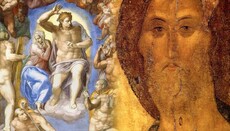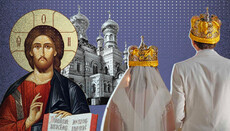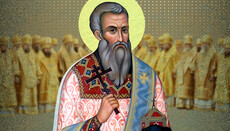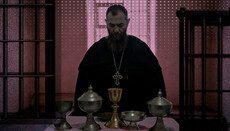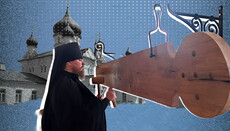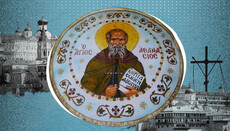“Picasso”: The Seizure of the Lavra
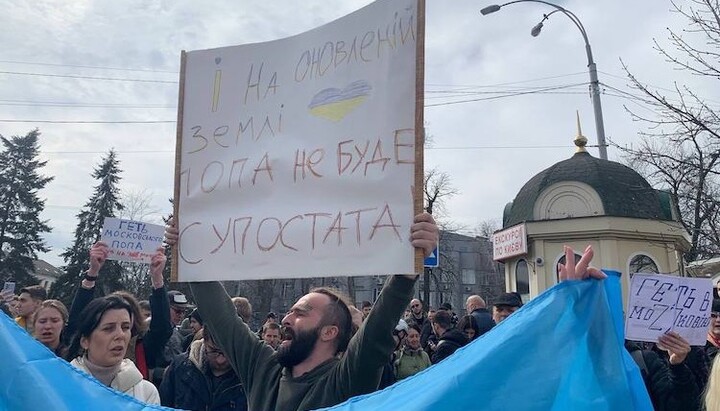
Excerpts from the book by Andrey Vlasov “Picasso. Part One: The Slave.” Episode 14.
Time: 1992
Place: Kyiv
Characters: Fr. Alexander Kaminsky; Misha Kaminsky, his son; Georgiy, Misha’s friend
At the very beginning of the Church’s troubles, Misha asked his father:
“Dad, what’s happening to us? Why such sudden enmity? And who’s right? Who’s right, Dad?”
Fr. Alexander answered evasively. Once upon a time, Filaret – who had now gone into schism – had ordained him a priest and helped him obtain registration from the Commissioner for Religious Affairs. He had grown accustomed to honoring him as “our lord and father.” And as for his authoritarian management style – the entire country had been authoritarian then. But to create a schism… that was too much.
On the evening of June 10, Fr. Alexander returned home from a clergy meeting of the Kyiv eparchy, which had taken place at the Kyiv-Pechersk Lavra. The issue discussed was only one: whose side are we on? With the bishops and the fullness of the Russian Orthodox Church and universal Orthodoxy? Or are we riding the new political wave of independence and breaking with all that? In the latter case, we would gain quite a reward – government favor, political and material support. That was the carrot. The first option, however, promised the stick – accusations of betraying national interests and aiding Moscow’s imperial ambitions, with all the ensuing consequences.
The discussion did not last long. Some invisible yet perceptible spirit came upon everyone present: truth and righteousness were on the side of the Church’s fullness – the people of God, the clergy, and the episcopate. All understood perfectly well that the new Ukrainian government, the state apparatus, the politicians, and the powers of this world – indeed the entire course of history itself – were united behind Filaret, proclaiming in one mighty voice: “An independent state needs an independent church.” But, as Scripture says, “If God is for us, who can be against us?”
True, a few elderly priests, who had once tasted what it meant to be out of favor with the authorities, whispered, “He’s got power behind him – you don’t know how strong it is. Filaret will scatter you like kittens.” Yet soon even they were carried away by the feeling of joy in standing for truth no matter what. They left the meeting inspired. “Come what may! The Church is no stranger to repression and persecution. May God only grant us courage not to falter.”
“Well, what happened, Dad? Tell us! What did you decide?” The family surrounded Fr. Alexander, showering him with questions.
“We decided to stand firmly in Orthodoxy! Not to go into schism with Filaret, whatever happens.”
“Hooray!” shouted five-year-old Andriusha, who understood nothing at his age, but was glad nonetheless at the prospect of “standing firmly in Orthodoxy.”
Misha remained silent. In their home, the name of Metropolitan Filaret had always been spoken with reverence and awe. He remembered once attending a Liturgy at St. Volodymyr’s Cathedral and receiving the primate’s blessing afterward. He remembered kissing with devotion the hand that had traced the sign of the Cross over his sinful head. He could not believe that this man was now a schismatic and an enemy of the Church.
“We decided to support the Kharkiv Council,” his father continued, “and the new primate, Metropolitan Volodymyr.”
“Daddy, is he good?” asked Andriusha innocently.
“Who?”
“Volodymyr.”
“Of course,” said his father, lifting the boy and kissing his cheek.
* * *
Two days later, Misha and his best friend Georgiy went to submit their documents to the Theological Seminary. They could have done it later, after receiving their high-school diplomas, but it was also possible to apply early and bring the diploma later. Those who submitted early could then take on various obediences, as it was called – manual work at the seminary. Volunteers were gladly accepted. Both the Kyiv-Pechersk Lavra and the seminary located within its grounds were actively being restored after years of neglect and were in great need of workers. There was much to do: cleaning, painting, helping builders, and more. Besides the moral satisfaction of doing a godly deed, there was a practical benefit: such applicants were known to the seminary leadership and teachers and could expect favorable consideration during entrance exams.
Most seminary students were from other cities and were provided accommodation in the Lavra itself. Kyivans usually lived at home. But Misha, fired by a noble impulse to take up the monastic path, persuaded the seminary administration – which was without a rector at that time, as the previous one had gone into schism – to let him live in the dormitory too.
The seminary dormitory occupied one of the Lavra buildings recently returned to the monastery. It was a medium-sized two-story structure, quite dilapidated, with a leaky roof and peeling paint. The entrance was in the middle, with a small porch, and just inside a staircase led to the second floor. There were two large rooms upstairs, one to the right and one to the left of the stairs, housing the seminarians. Before the 1917 Revolution, such student lodging had been called a bursa, and the nickname stuck: the seminary itself was jokingly called the bursa, and its students, bursaks.
The two rooms were separated by a small corridor leading to the staircase, a toilet, and a shower room. The walls, up to eye level, were painted a dull blue, long since faded and flaking. Above that, whitewash, equally old, streaked with brown water stains where the roof leaked. The wooden floor had been painted perhaps a hundred times and worn through a hundred and one. Each room contained about fifteen to twenty double bunk beds, so the bursa housed roughly seventy people. For all of them there were only two toilets and four sinks – a detail one can’t help but mention. Because of this, many students went outside to a public restroom, which was in even worse shape.
This was not the only dormitory of the seminary, reopened in 1989 and already with four full classes; the others were about the same.
The seminary building itself stood nearby, with its refectory on the lower floor.
In summer, most students left for home, so Misha and Georgiy, settling into the ancient monastery with a few other applicants, felt wonderful. The conditions were spartan, of course, but monastic life was meant to be austere. Misha, whose initial zeal was only kindling, was ready to endure much worse. Georgiy even found their accommodations not ascetic enough.
About a week after moving in, following long days of labor improving the seminary grounds, they faced an unexpected trial. On the evening of June 18, Misha was returning from his parents’ home to the Lavra, loaded with pies and foodstuffs. He had protested against his mother’s interference in their ascetic life, but she insisted. From the Arsenalna metro to the Lavra was three trolleybus stops, but Misha always walked, reciting in his mind the Jesus Prayer: “Lord Jesus Christ, Son of God, have mercy on me, a sinner.” Every step closer to the Lavra – that first great shrine of Rus’ – filled him with unspeakable joy and spiritual uplift. But that day, as he exited the metro, he heard an alarming bell toll – a tocsin, the kind that throughout history summoned people to the church in times of danger.
“Fire,” he thought and broke into a run.
Suddenly the bell fell silent. He noticed some women in church dress hurrying toward the Lavra as well. About forty meters from the holy gates, a middle-aged man with a leather briefcase stopped them.
“Don’t go! Don’t go to the Lavra!” he shouted. “The police are seizing the monastery – they’re beating the monks with batons! Don’t go!”
He blocked their path, urging them to turn back.
“I live here,” Misha threw back and ran faster.
Along the way, he saw more men trying to stop those heading toward the sound of the bell.
Inside the Lavra, there were indeed more policemen than usual – ordinary patrols who were often stationed there. They stood around in small groups, not seizing or beating anyone. There were quite a lot of people for evening time. It was already dusk, and the streetlights were coming on. Everyone was agitated, running about, shouting.
From snippets of conversation, Misha gathered that about half an hour earlier, unknown young men had climbed over the fence of the Lower Lavra and burst into the building housing the monastery’s abbot. There were around a hundred of them, wielding chains and metal rods, beating any monks they met. One of the brothers had rushed to the belfry and struck the alarm bell – the same bell Misha had heard leaving the metro. The intruders had heard it too. They climbed the belfry, beat the monks who were ringing the bell, and cut the ropes from the clappers with knives.
In the abbot’s house, they smashed doors and furniture and threw the abbot himself out. One of them explained on camera: “We came to return the Kyiv-Pechersk Lavra to the Ukrainian Church and its people.”
Misha dashed into his dormitory, dropped his bags by the stairs, and ran toward the abbot’s building. A crowd had gathered; near the entrance stood a group of athletic-looking young men with clubs and rods. One had nunchaku. From inside came noise, shouting, crashes. A monk, his cassock flapping, tried to enter the building, but one of the thugs shoved him in the chest and knocked him down. As he lay there, they kicked him in the stomach several times. Misha and a woman rushed to help. The woman was pushed away; Misha was punched in the face and struck in the back with something heavy. He too fell.
The nearby policemen watched with interest but didn’t lift a finger. An elderly woman began shouting at them:
“You Herods! Don’t you see they’re beating monks? They’re seizing the Lavra! What are you standing there for?! Do something! Or are you with them?!”
“Ma’am, we’re not with anyone,” they replied. “This is your church quarrel – we’re not getting involved. We’re guarding the museum, not the monastery. Got it?”
Some seminarians came over and helped Misha up. Everyone was confused – where to run, what to do? It was now fully dark. The street was lit by lamps and windows.
Suddenly, the OMON (riot police) appeared. Well-equipped, armed with rubber batons, they quickly moved toward the seized building. The attackers panicked. Many threw down their chains and fled; some resisted but were quickly subdued, pinned face down on the pavement. The OMON entered the building – cries and blows were heard. After a while, they began bringing out the thugs, searching them, and loading them into buses. Some policemen started questioning witnesses and writing reports.
The Lavra buzzed until morning, discussing the events and preparing for new provocations. The next day, a police general arrived – Deputy Minister of Internal Affairs Valentyn Nedryhailo. He tried to convince the monks that the previous night’s attackers – sent, as it turned out, by the deposed Metropolitan Filaret – were in fact the lawful owners of the Lavra. Waving a resolution of the Verkhovna Rada that refused to recognize the Kharkiv Council, he insisted that Filaret was still the head of the Church and that all the monastery’s buildings legally belonged to him.
But several hierarchs were already in the Lavra and gave the general a firm rebuff. One of them, Archbishop Makariy, would later play a decisive role in liberating the Lavra. He managed to reach then–Prime Minister of Ukraine Vitold Fokin by phone and demanded, in ultimatum form, an immediate end to the lawlessness. Fearing international scandal, Fokin sent the OMON to aid the defenders of the monastery. Incidentally, he was soon dismissed from office.
The whole scheme of seizing the Lavra on the night of June 18–19 had been intended to thwart the arrival of the new primate of the Ukrainian Church on the twentieth. The plan failed spectacularly, and Metropolitan Volodymyr solemnly entered the Lavra as its lawful and universally recognized archpastor.
* * *
Misha had never before seen such rejoicing among the faithful. Thousands upon thousands of people filled the Lavra – standing at the Holy Gates, the square before the Refectory Church, around the ruins of the Dormition Cathedral. From the belfry rang the joyful peal of bells. Heavenward rose a many-voiced prayer: “Christ is risen from the dead…”
The people were welcoming their archpastor. Very few remembered him from his days as a vicar bishop in Kyiv, but everyone felt with their hearts: here he was – a true, grace-filled primate, a wise helmsman, a protector and father. Misha saw with his own eyes what genuine love of the people meant. He didn’t know that tens of thousands more had greeted Metropolitan Volodymyr at the train station with bread and salt and the singing of Paschal hymns. While they were still walking toward the Lavra, His Beatitude was already addressing the faithful from the ambo of the Refectory Church.
Misha somehow expected to hear words of thanks to the defenders of the Lavra – after all, had events turned otherwise, the Metropolitan might not be standing there now. Misha’s back still ached from the blows, his lip was split. He wanted His Beatitude to acknowledge their struggle, to denounce the schismatics, to condemn their sacrilege. Such thoughts whirled in his youthful head.
But he heard something entirely different:
“I did not come from abroad; I have returned to my home… to my native home. My hope is only in God and in you – in your prayers, your love. We must be steadfast and treat with love all those who do not share our life or our thoughts… For in Christianity there is no place for enmity… no place for national chauvinism, nor for confessional hatred.”
These words could not but touch the heart – as did the fact that the Metropolitan, born in Khmelnychchyna but having spent most of his life in Russia, addressed the Ukrainian people in their pure, native language.
One of his first acts as primate was the appointment of a new rector for the Theological Seminary.
* * *
For the deposed Metropolitan Filaret, the final straw was to appeal to the primates of the other Local Orthodox Churches. He sent complaints against all the hierarchs of the Russian Orthodox Church who had, as he claimed, unlawfully deprived him of office and rank. Patriarch Alexy II, in turn, sent letters explaining the Church situation in Ukraine. The replies came quickly: one after another, the patriarchs refused Filaret their support and sent messages of greeting to Metropolitan Volodymyr.
It seemed the curtain had fallen, the play was over. But no.
On June 25–26, 1992, the deposed Filaret convened yet another event, pompously named the “All-Ukrainian Council.” It was the so-called unification council of the Ukrainian Autocephalous Orthodox Church (UAOC) and the “Ukrainian Orthodox Church.” The latter was represented by only two former bishops of the canonical Church – Filaret himself and Bishop Iakov of Pochaiv, who had earlier been expelled from the Pochaiv Lavra – as well as two “bishops” hastily “ordained” by them while both were already under suspension.
The UAOC traced its history to November 9, 1917, when the Third All-Ukrainian Military (!) Congress in Kyiv adopted a resolution proclaiming the autocephaly of the Ukrainian Orthodox Church, its independence from the state, and the Ukrainization of worship. That schism, born in the wake of the 1917 revolution, had nearly disappeared under Soviet rule but was revived again in 1989 during perestroika. Like all schisms, it engaged in the same activity – forcibly seizing parishes from the Church and accepting clergy suspended for various offenses. At that time, the still-canonical Metropolitan Filaret had called the UAOC “a sewer into which all impurities flow.” And it was with this very “sewer” that he now had to unite.
At the “All-Ukrainian Council,” nine of the eleven “bishops” of the UAOC were present, though three left in protest when they realized the plan was to unite with their detested Filaret. Nevertheless, the “Council” decided to dissolve both the Ukrainian Orthodox Church and the Ukrainian Autocephalous Orthodox Church and to merge them into a single Ukrainian Orthodox Church – Kyiv Patriarchate. The UOC-KP was declared the legal successor of both bodies, inheriting all their assets – churches, monasteries, seminaries, and bank accounts. Even corporate raiders in business couldn’t dream of such a coup!
The head of the new UOC-KP was proclaimed to be the ninety-four-year-old “Patriarch” of the UAOC, Mstyslav Skrypnyk, who was living in the United States and had no idea that any “All-Ukrainian Council” had taken place. Filaret became his deputy, and control of the new “Church” was vested in a “Higher Church Council,” which included, alongside “clergy,” certain members of the Verkhovna Rada of Ukraine.
Poor Mstyslav learned of the abolition of his Church only days later and called on his supporters not to recognize the merger.
Thus was born the Kyiv Patriarchate.
* * *
Misha and Georgiy spent the entire summer laboring for the Lavra and the seminary, passed their entrance exams successfully, and were admitted to the first year.
To be continued…
The previous episode of the book is available here.
